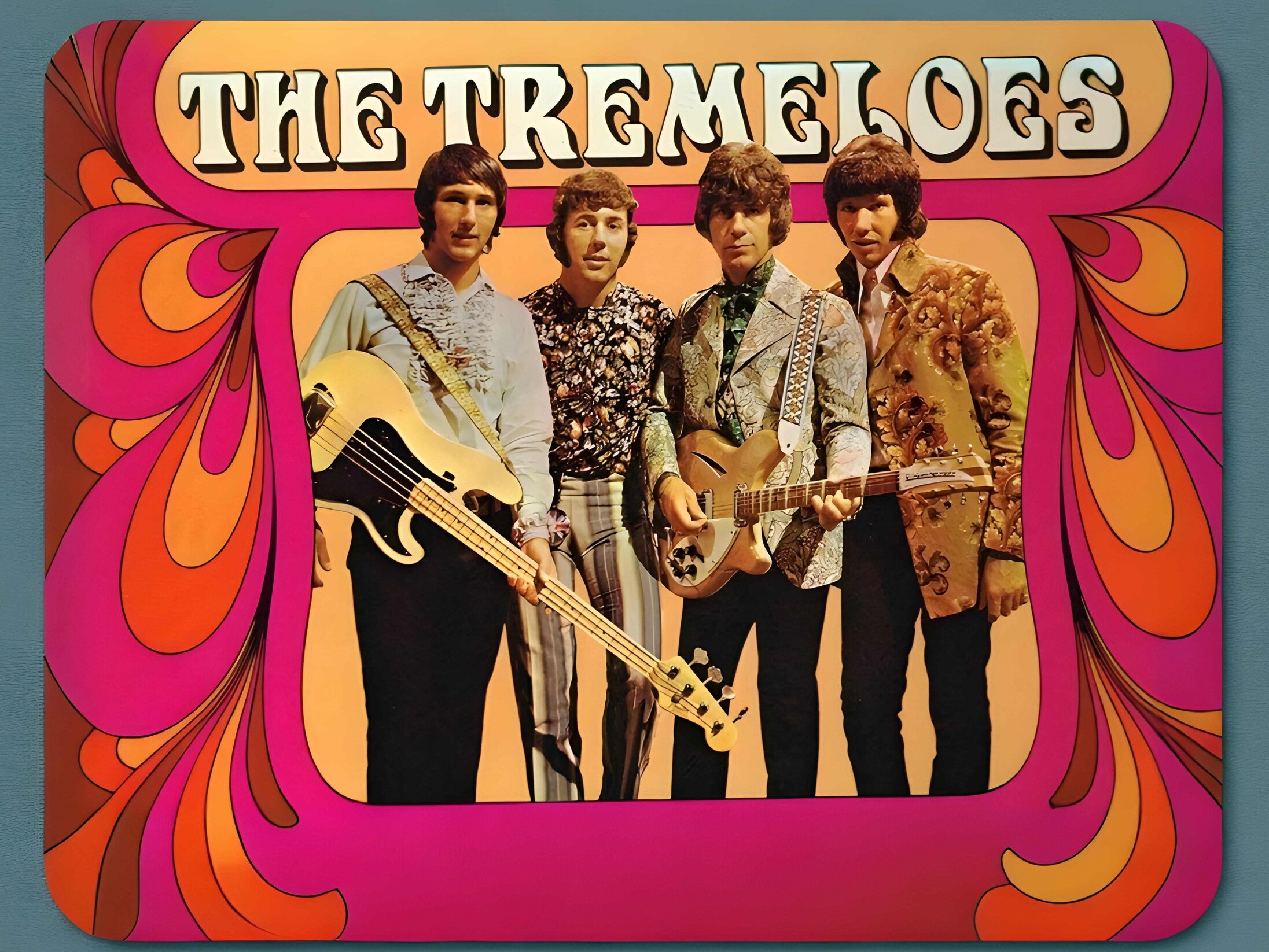
Peter Checksfield, author of The Tremeloes – Even The Bad Times Are Good!, picks The Tremeloes’ dozen greatest psychedelic tracks.
What A State I’m In (B-side of ‘Good Day Sunshine’, August 1966)
Despite issuing their last single together in November 1965, Poole and The Tremeloes would remain together for more than a year, continuing to tour together until the early weeks of 1967. Despite this, they released records separately during this period, and it is the B-side of The Tremeloes’ 2nd single without Brian where they really came into their own. A freak-beat psych-out with fuzz guitar that’s sung by drummer Dave Munden, ‘What A State I’m In’ is something that is light years away from what they were recording the previous year. The Tremeloes would largely continue to put their more musically-adventurous material on single B-sides throughout the rest of the ‘60s.
Let Your Hair Hang Down (B-side of ‘Silence Is Golden’, May 1967)
‘Let Your Hair Hang Down’ is a song that owes a debt to the ‘Mod’ sounds of The Who and The Small Faces, with a falsetto lead vocal, distorted fuzz-guitar and all-over-the-place drums (the low voice singing the title line by the way is producer Mike Smith). Guitarist Rick Westwood recalls how he got his unique tone: “The fuzz sound on ‘Let Your Hair Hang Down’ was either my Gibson Fuzz or a British Pedal Company Tone Bender… or maybe the Solar Sound Tone Bender, which looked the same. I cut out a space below the tone and volume controls of a Fender Jaguar and fitted the Gibson Fuzz into the guitar and also included an on/off switch for the fuzz. My Dad cut out a steel-plate and shaped it to fit around the fuzz pedal controls and the volume and tone controls of the guitar. He then had it chrome plated.”
Suddenly Winter (B-side of ‘Be Mine’, October 1967)
With its way-out backwards guitar and hi-hat intro, one could be forgiven for thinking they were listening to The Jimi Hendrix Experience rather than The Tremeloes – that’s how far-out ‘Suddenly Winter’ starts off. Instead, it quickly evolves into a melodic Pop-Rocker with soaring harmonies and just the occasional Hendrix-inspired touches, and wouldn’t have sounded out of place on The Pretty Things’ ‘S.F. Sorrow’ album. An extraordinary recording that could perhaps have been a bigger success than the A-side.
Sunshine Games (‘Alan, Dave, Rick and Chip’ LP, December 1967)
First released by American band The Music Explosion in August 1967, The Tremeloes’ version of ‘Sunshine Games’ lacks the proto-punk garage feel of the original, but more than compensates by some nice The Searchers-styled jangling guitars and harmonies. It was written by Eric Woolfson, later of The Alan Parsons Project fame – someone who contributed several good songs to The Tremeloes around this time.
Girl From Nowhere (B-side of ‘Helule, Helule’, 1968)
‘Girl From Nowhere’ is almost just a Beatles/Bonzos-styled piano-led Pop-Rock song – but what kicks it into another stratosphere are Rick’s ground-breaking ‘bagpipes’ interludes played on his guitar, which, when combined with Dave’s drum rolls, sounds just like a Scottish marching band.
(If You Think You’re) Groovy (‘BBC Sessions’, 2004)
For a BBC radio performance on ‘The David Symonds Show’ in August 1968, The Tremeloes included an exclusive cover of ‘(If You Think You’re) Groovy’, a song written by The Small Faces’ Steve Marriott and Ronnie Lane, and a January 1968 single for P.P. Arnold. It is absolutely superb! A great song anyway, Dave sings with passion, and the band play with commitment and vigour, giving a foretaste of the more serious direction The Tremeloes would go in the not-so-distant future. This essential performance is on ‘BBC Sessions’, and they also performed it on an edition of the sadly long-lost ‘Colour Me Pop’ TV show.
Instant Whip (B-side of ‘(Call Me) Number One’, October 1969)
‘Instant Whip’ is even more of a shift in styles than the A-side. An instrumental jam with wild drumming, screams, hard-riffing guitars and maracas, it’s closest cousin was probably Chicago’s version of the Spencer Davis Group’s ‘I’m A Man’, but this is far more crazed. Can this really be the same band that made all those chart-friendly singles? As Dave Munden later recalled: “I’m not saying that I never indulged in a few illegal substances. We did. I think everybody did. But we knew when enough was enough. You know, we had the presence of mind to think, no, that’s it, you know, done that, been there, done that, seen that, got the T-shirt – now should get on with life, you know.”
Anything (‘May Morning’, 2000)
In the early months of 1970, The Tremeloes were commissioned to write and perform the music for ‘May Morning’, a movie directed by Ugo Liberatore, and starring Jane Birkin, Alessio Orano and John Steiner. But it was all in vain: the movie was a major flop, so the soundtrack wasn’t released. Fortunately, the master tapes survived, and the album was given a very belated release some 30 years later – when it quickly gained a reputation as a lost gem, becoming essential listening for connoisseurs of British Pop-Psych.
Probably taking their inspiration from The Faces and The Rolling Stones, ‘Anything’ starts off sounding gloriously ragged and rustic, but then develops into a powerful Country-tinged Rock song, complete with wah-wah guitar and some pretty powerful drumming. An alternate take is on ‘The Complete CBS Recordings 1966-72’, while a more electric version for BBC radio circulates unofficially. Three years later, the chorus for ‘Anything’ would be recycled for the song ‘Make Or Break’, a.k.a. ‘Make It – Break It’.
What Can I Do (‘Boxed’, 2000)
Not released until 2000, the Pop-Psych, piano-led ‘What Can I Do’ from 1970 features nasal, compressed vocals from Dave, and the kind of layered guitar sound later heard on many Queen records, but pioneered by Rick Westwood. When the song first surfaced on ‘Boxed’, it was credited to Alan Blakley and Len Hawkes, but on some subsequent releases, Gilbert O’Sullivan – who released his own version on a 1968 single – is correctly listed as the writer. It’s certainly a highly worthwhile track that didn’t deserve to remain in the can for 30 years, and the band themselves must’ve liked it, as they still performed it on BBC radio’s ‘Saturday People’ in late 1969, as heard on ‘BBC Sessions’.
Wait For Me (‘Master’ LP, November 1970)
With Dave sounding like a more powerful John Fogerty, ‘Wait For Me’ has a very fuzzy Hard Rock guitar riff, an incredible guitar solo, and a catchy chorus that is backed by just bass and drums. In fact, throughout, there are some oddly under-produced touches – but if this is the “unfinished” album that Len ‘Chip’ Hawkes complained about at the time, it largely works in its favour. A very different alternate take can be found on 2000’s ‘Master – The Early 70’s Sessions’ collection.
No More Sad Songs (‘Boxed’, 2000)
Originally released as ‘Please No More Sad Songs’ by Idle Race in November 1969, The Tremeloes’ 1971 version, released as ‘No More Sad Songs’ is faster and rockier, but otherwise largely retains the Pop-Psych feel of the original. Not released until 2000’s ‘Boxed’, where it was credited to Blakley and Hawkes, on 2020’s ‘The Complete CBS Recordings 1966-72’ both Jeff Lynne’s writing credit and the full title were corrected.
Rocking Circus (‘Space’ [a.k.a. ‘Don’t Let The Music Die’] LP, 1975)
Towards the end of 1974, two key members quit the band – as later recalled by Len ‘Chip’ Hawkes: Len: “In 1975 Alan and I were getting more and more disillusioned. As the hits had dropped off by then we both decided to leave the band and embark on our own solo projects. Alan went into producing, and I was signed as a solo artist with RCA records, and moved to Nashville and stayed, with my family, for almost 5 years until 1979.” Dave Munden and Rick Westwood continued with newer members Bob Benham and Aaron Woolley (both formerly in the Tremeloes-managed band Jumbo), initially releasing this single and the concurrent album under the pseudonym ‘Space’.
Starting with distant circus-style music and crowd noise, this is a brilliant Beatles pastiche, with Dave sounding more like Lennon than the man himself, and some spot-on SGT. Pepper/Magical Mystery Tour instrumentation and production. The lyrics even mention John Lennon being “top of the bill” at the “Rock ‘n’ Roll Circus”. Sadly, ‘Rocking Circus’ was released without the fanfare it deserved, and passed the world by largely unnoticed.
Further information
Famously signed to Decca instead of The Beatles, Brian Poole and The Tremeloes spent four years topping the charts, touring the world, and appearing in movies. Incredibly, when they split from their former lead singer, The Tremeloes went on to even greater success, with the four members – Alan, Dave, Rick & Chip – becoming one of those few bands (The Beatles & The Monkees among them) to be known just by their first names. With exclusive interviews with band members and dozens of previously unseen photos, acclaimed music historian Peter Checksfield tells The Tremeloes’ story – via their many record releases – in this remarkable book:
The Tremeloes – Even The Bad Times Are Good! (EVERY SONG FROM EVERY SESSION)




